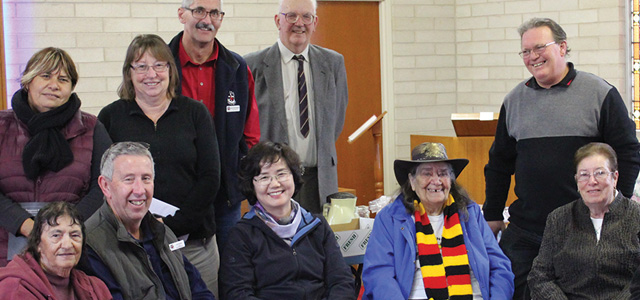In the third of our four-part series about The Murray Darling Basin, the locals at Menindee remember better days — and the Moderator calls for us to remember Menindee.
The pastoral visit’s next stop is the remote Bono Station near Menindee, where the Bell family of five have faced one water extreme to another. Two years ago, they were forced to move to another house because the river flooded the homestead. Now, with almost no water in the river, they have invested in the expensive process of drilling bores.
It is almost 40 kilometres to Menindee from Bono, over clay pans through mulga and saltbush country. “Menindee is a small congregation and the small edge of the Presbytery,” says Rev. Park. “But that doesn’t mean they are less important. Because of their ‘weak body’, we need to pay more attention and give more pastoral support.”
Uniting Church Congregation members, a councillor and local Aboriginal people meet with the Moderator. The locals are frustrated with the Government’s lack of action about the water crisis.
Evelyn Bates is an Aboriginal woman from the Darling River Barkindji tribe and one of the eldest people left in Menindee. Her family comes from the area between Bourke and Wentworth. “To me, the river is the main thing for the people,” says Bates. “The Barkindji people lived all their lives along the river; the kids loved swimming and fishing. Now you can’t ever catch a fish.
“There was a water flush once from the lake but it was poison. All the yabbies were crawling out of the river; a lot of fish died. It was terrible.
“We’re not asking for a flood. We want our share of the water because everything that was here in Menindee has all gone. Our young people living here have no work. They used to do grape and fruit picking in the orchards but everything has closed down.”
The Menindee Faith Community and elders, including Evelyn Bates (bottom left) and Beryl Carmichael (centre right).
The Department of Primary Industries funds delivery of water to people in Menindee because they have been told not to drink or swim in the water. But the proposed pipeline from Wentworth to Broken Hill is not favoured here, as it will effectively bypass Menindee.
Local councillor Margo Muskat has lived in Menindee since the 1960s when there were only dirt roads to Broken Hill and no phones. “I love my community; we are all socially inclusive,” she says. “It doesn’t matter wherever you go, you will always see different generations caring for each other. Years ago, there used to be market gardens, local bread and a butcher. People would camp by the lakes; it was a holiday and recreation area. Now, there is no water to see.”
The elders recall the floods of the ’50s and ’70s, and how the water storage system seems to have worsened their situation. “We kept arguing with the government to let the locals have control rather than Sydney or Canberra,” says elder of the Ngiyaempaa people Beryl Carmichael. “Much has changed since what was here in the ’60s. Food was freshly harvested and locally grown and there were no chemicals used.”
PART 2: Storage schemes, broken streams
Show your support
- Churches and individuals can support the people of the Lower Darling by contributing to the Synod Disaster Fund
- To register for the annual Murray Darling Basin Tour in September 2016, click here
- Click here to email any other enquiries about the Murray Darling Basin Tour












